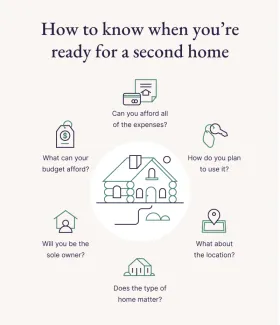
Thinking About Buying a Second Home? Here's What You Need to Know
The idea of owning a second home is a dream for many. Whether it's a cozy cabin in the woods, a beachside cottage, or a condo in the city, a second home represents a place of escape and relaxation. It's a haven where you can create lasting memories with family and friends. But before you take the plunge into second home ownership, there are essential factors to consider. Here's what you need to know to make an informed decision.
Define Your Purpose
The first step in the journey of owning a second home is to clearly define your purpose. What do you intend to do with this property? Are you looking for a vacation retreat where you can unwind and create cherished moments with loved ones? Or are you considering a second home as an investment property to generate rental income? Your goals will significantly impact your decisions moving forward, so it's crucial to be clear from the outset.
Location, Location, Location
The old real estate adage "location, location, location" holds true when it comes to second homes. While a remote cabin in the mountains or a beachfront property might sound idyllic, consider the practical aspects. Is the location easily accessible from your primary residence? If it's more than an hour away, you might need to think about local caretakers to manage the property in your absence.
If you plan to spend extended periods in your second home, proximity to essential services, such as medical facilities, becomes vital. Additionally, consider the convenience of guest parking if you anticipate friends and family visiting frequently.
Weigh the Costs
Owning a second home can be an expensive endeavor. It's essential to evaluate whether this purchase aligns with your financial stability. The costs of acquiring, maintaining, and insuring a second property can add up quickly. You need to ensure that these expenses won't strain your finances or compromise your long-term financial goals.
One significant financial consideration is that owning a second home involves tying up a portion of your wealth in an illiquid and non-diversified asset. This can impact your overall net worth and affect plans for generational wealth transfer or philanthropic giving.
Becoming a Landlord
If you're thinking about generating rental income from your second home, it's important to be aware of the responsibilities and potential challenges. Renting out your property can lead to extra wear and tear. Therefore, setting clear boundaries and expectations with tenants is crucial. Consider having tenants sign formal agreements that address accident and damage liability.
Many advisors recommend owning a second home through a limited liability company (LLC). This can provide a layer of protection, shielding you from personal exposure to lawsuits that might arise from renting the property.
Primary Domicile for Tax Purposes
For tax purposes, you must designate one of your homes as your "primary domicile." This is the home where you spend more than half the year. Keep in mind that tax exclusions for home sales typically apply only to your primary residence. Therefore, any gains from the sale of your second home might not be eligible for these tax benefits.
In conclusion, buying a second home is an exciting prospect, but it's not a decision to be taken lightly. Careful consideration of your goals, location, costs, and potential rental income is essential. Additionally, evaluating the merits of leasing versus owning can help you make an informed choice. A second home should enhance your life, providing a place of joy and relaxation rather than becoming a financial burden.
To read the full article, please follow this link.

